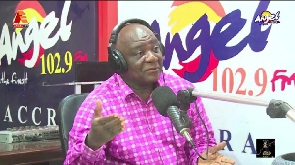One of the presidential hopefuls listed for the New Patriotic Party's (NPP) presidential primary scheduled for November 4, Mr Francis Addai Nimoh, has openly acknowledged that the party's unity has been seriously impacted following the results of the Super Delegates Conference held on August 26, 2023.
Mr Nimoh expressed his concerns about the entire process leading up to the decentralised conference and the subsequent results, stating that they have left the party's unity in a fragile state as they approach the 2024 general elections.
He pointed out that some of the relationships between the candidates and the delegates have been strained as a result of the Super Delegates conference.
Mr Addai Nimoh, who occupies the fourth position on the NPP's presidential primary ballot, made these remarks during an interview on the Ghana Yensom Morning show, hosted by Odehyeeba Kofi Essuman on Accra 100.5 FM, on Friday, September 22, 2023.
To mitigate the damage to these relationships within the party, Mr Addai Nimoh revealed that the nine aspirants collectively suggested to the Presidential Elections Committee that the Super Delegates Conference to reduce the number of aspirants from 10 to five should be centralised. However, the National Executive Committee of the party rejected this proposal.
Reflecting on his own experiences, Mr Addai Nimoh, a former Member of Parliament from the Ashanti Region, shared that he had personal relationships with delegates in the region who had promised to vote for him but ended up not doing so, allegedly due to pressure to vote for other candidates, he alleged.
This, he said, had fractured the trust and rapport between the aspirants and the delegates.
The disappointing results from the super delegates conference have also left many party delegates feeling disheartened.
Mr Nimoh cautioned that if immediate measures are not taken, the fragile unity within the party could persist and adversely affect the performance of the party in the upcoming general elections.
He expressed his bewilderment at the party leadership's decision to disregard the recommendation of the nine aspirants, which would have allowed all over 900 delegates to vote for their preferred five candidates on the ballot.
Such a move, he believes, could have alleviated the pressure on the delegates and potentially prevented these fractures in the party's unity.
Politics of Saturday, 23 September 2023
Source: classfmonline.com
NPP's unity was shaken after August 26 super delegates confab – Addai-Nimoh
Entertainment
















